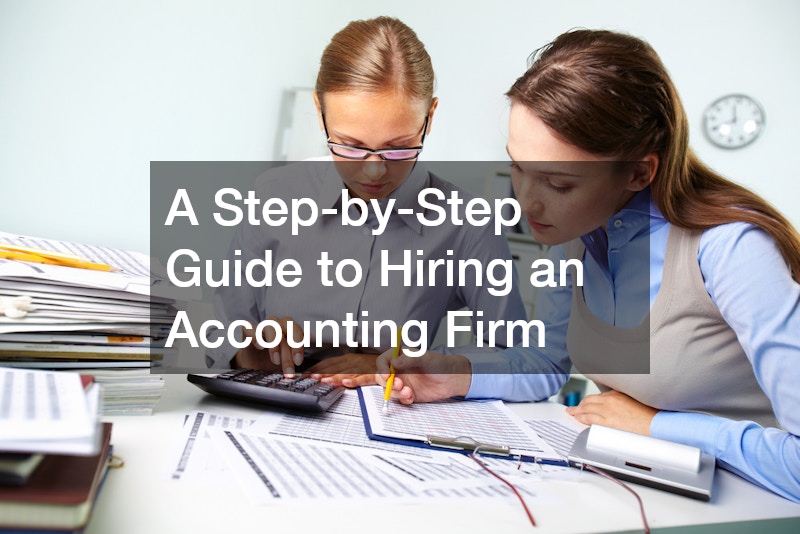Finding the right support for your financial affairs is essential for long-term success, whether you’re managing a business, investing in property, or simply looking to stay on top of personal finances. Hiring one of the many professional accounting firms available in the market can be a game-changer, but making the right choice requires careful planning. With so many options and specialisations available, it’s important to take a strategic and informed approach.
This step-by-step guide will walk you through everything you need to consider when choosing the right accounting firm to meet your needs.
Define Your Financial Needs
Before reaching out to any accounting firms, it’s crucial to assess what kind of services you require. Accounting isn’t a one-size-fits-all profession. Some individuals may need basic tax preparation, while others might require help with audits, business consulting, payroll services, or even forensic accounting. Business owners may also require industry-specific knowledge, such as familiarity with GST, inventory management, or financial forecasting. Understanding the scope and complexity of your needs will help you narrow your search and find firms with the appropriate expertise.
Do Your Research
Once you understand what services you require, the next step is to research potential accounting firms. Start by looking at firms that specialise in the services you’re after. Use online directories, professional networks, and referrals from colleagues or friends to build a list of candidates. Check credentials, certifications, and industry affiliations, such as CPA (Certified Practising Accountant) status, to ensure legitimacy and professional standards. Read reviews, look at websites, and pay attention to the types of clients they usually work with. It’s helpful to look for testimonials or case studies, which can provide insight into how the firm has supported clients with similar financial circumstances.
Check for Local Experience & Industry Knowledge
While remote and cloud-based accounting services have grown significantly, hiring a firm with local experience can offer significant advantages, especially when navigating region-specific tax regulations and compliance requirements. If you’re running a business, industry knowledge becomes even more important. Accounting firms familiar with your sector are more likely to anticipate potential issues and provide proactive advice tailored to your financial landscape. Whether it’s hospitality, construction, retail, or professional services, having an accountant who understands the specific challenges and opportunities of your industry is highly valuable.
Schedule Initial Consultations
After narrowing down your list, schedule initial consultations with two or three shortlisted firms. Most accounting firms offer a free or low-cost initial meeting where you can discuss your needs, ask questions, and assess whether the firm is the right fit. Use this time to evaluate how clearly they communicate, whether they ask relevant questions, and how comfortable you feel discussing your finances. You should also clarify whether you’ll be working directly with a partner or a junior accountant and how communication is typically handled—via phone, email, or in-person meetings. These early conversations are an excellent opportunity to gauge their responsiveness and professionalism.
Ask About Fees & Contracts
Financial transparency is essential, and it’s wise to be upfront about your budget. Accounting firms vary in their pricing models, with some charging hourly rates while others offer fixed-fee packages or retainers. Ask for a detailed breakdown of fees and understand what’s included in each package. Make sure there are no hidden charges for services like lodgement of forms or additional consultations. Request a written contract or engagement letter that clearly outlines the services provided, fees, timelines, and mutual expectations. This will prevent misunderstandings and protect both parties as the relationship progresses.
Evaluate Their Technology & Systems
Modern accounting is increasingly digital, and a good firm should be proficient with up-to-date accounting software and cloud-based systems. If you’re a business owner, ensure the firm can work seamlessly with your existing platforms, whether it’s MYOB, Xero, QuickBooks, or another system. Strong tech proficiency helps streamline processes, reduce paperwork, and ensure that your data remains accurate and secure. Moreover, firms that embrace technology are more likely to provide real-time insights and data-driven recommendations that can enhance your financial decision-making.
Check for Availability & Ongoing Support
It’s important to ensure that the firm you choose can offer ongoing support throughout the year—not just during tax season. Whether it’s quarterly reporting, payroll queries, or financial planning, you should feel confident that assistance is available when needed. Establish how quickly you can expect responses to queries and who your main point of contact will be. Continuity is key in financial management, so it helps to work with firms that are consistent and dependable, with a clear communication protocol in place.
Make Your Final Decision with Confidence
Once you’ve done your due diligence, met with potential candidates, and compared proposals, it’s time to make a well-informed decision. Choose the firm that aligns with your values, meets your service expectations, and fits your budget. Keep in mind that switching firms later can be disruptive and time-consuming, so taking the time to make the right choice from the outset is a smart investment in your financial future.
Hiring the right accounting firm can help you stay compliant, reduce risk, and plan more effectively for the future. Whether for individual or business needs, selecting from among professional and trustworthy accounting firms with a clear process in place ensures peace of mind and long-term success.

